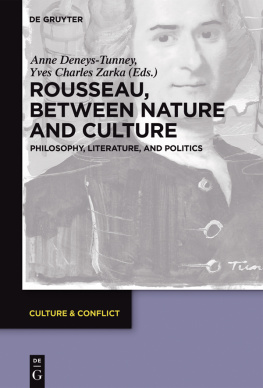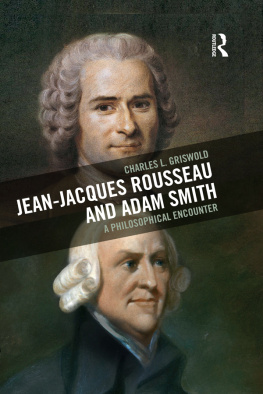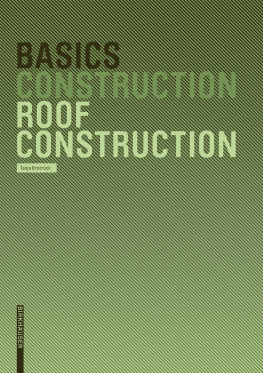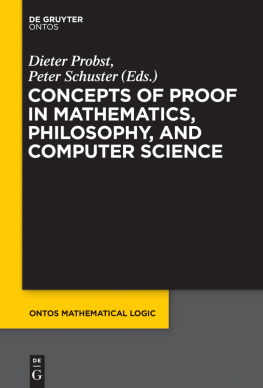Rousseau Between Nature and Culture
Guide

Rousseau Between Nature and Culture
Culture & Conflict

Edited by
Isabel Capeloa Gil and Catherine Nesci
Editorial Board
Arjun Appadurai Claudia Benthien Elisabeth Bronfen Joyce Goggin
Lawrence Grossberg Andreas Huyssen Ansgar Nnning Naomi Segal
Mrcio Seligmann-Silva Antnio Sousa Ribeiro Roberto Vecchi
Samuel Weber Liliane Weissberg Christoph Wulf
Volume 8

ISBN 978-3-11-045075-0
e-ISBN (PDF) 978-3-11-045718-6
e-ISBN (EPUB) 978-3-11-045667-7
ISSN 2194-7104
Library of Congress Cataloging-in-Publication Data
A CIP catalog record for this book has been applied for at the Library of Congress.
Bibliographic information published by the Deutsche Nationalbibliothek
The Deutsche Nationalbibliothek lists this publication in the Deutsche Nationalbibliografie; detailed bibliographic data are available on the Internet at http://dnb.dnb.de.
2016 Walter de Gruyter GmbH, Berlin/Boston
Cover image: Stephen Tunney
www.degruyter.com
Editions and Abbreviations
Unless otherwise indicated, the references to Rousseaus works and correspondence are from the following standard editions and will be indicated right after references or quotations in the body of the chapters, rather than in footnotes. Rousseau, Jean-Jacques. uvres compltes . Gen. Eds. Bernard Gagnebin and Marcel Raymond. 5 vols. Paris: Gallimard, Bibliothque de la Pliade, 19591995.
The title will be abridged throughout as OC followed by the volume number and the pagination in Arabic numerals.
Rousseau, Jean-Jacques. The Collected Writings of Rousseau . Gen. Eds. Roger D. Masters and Christopher Kelly. 13 vols. Hanover: UP of New England, 19902010.
The title will be abridged throughout as CW followed by the volume number and the pagination in Arabic numerals.
Correspondance complte de Jean-Jacques Rousseau . Ed. Ralph A. Leigh. 52 vols. Geneva: Institut et Muse Voltaire; Madison: U of Wisconsin P; Oxford: Voltaire Foundation, 19651998.
The title will be abridged throughout as CC followed by the volume number and the pagination in Arabic numerals.
In addition, the following acronyms will be used to refer to Rousseaus works:
| C : | for Les Confessions (OC 1); The Confessions and Correspondence, Including the Letters to Malesherbes (CW 5) . |
| CS : | for Du Contrat Social (OC 3); Social Contract (CW 4) . |
| D : | for Rousseau Juge de Jean Jaques ( OC 1); Rousseau, Judge of Jean-Jacques: Dialogues ( CW 1). |
| DSA : | for Discours sur les sciences et les arts (OC 3); Discourse on the Sciences and Arts (CW 2) . |
| E : | for mile, ou De l ducation (OC 4) ; Emile or On Education (CW 13) . |
| EOL : | for Essai sur l origine des langues (OC 5); Essay on the Origin of Languages (CW 7) . |
| Julie : | for Julie, ou La Nouvelle Hlose (OC 2); Julie or the New Heloise (CW 6) . |
| LA : | for Lettre d Alembert (OC 5); Letter to d Alembert (CW 10) . |
| LF : | for Lettre M. de Franquires (OC 4); Letter to Franquires (CW 8) . |
| LM : | for Lettres morales (OC 4) . |
| R : | for Les Rveries du promeneur solitaire (OC 1); The Reveries of the Solitary Walker (CW 8) . |
| SD : | for Discours sur l origine et les fondements de l ingalit parmi les hommes [Second discours] (OC 3); Discourse on the Origins of Inequality [Second Discourse] (CW 3) . |
When citations and paginations refer to both editions, references to the English editions will follow the pagination in OC and will be given in brackets, such as: Second Discourse ( OC 3: 122 [ CW 3: 12]), or ( SD 122 [12]).
Anne Deneys-Tunney,
Yves Charles Zarka
Introduction
Like the statue of Glaucus, which time, sea, and storms had so disfigured that it looked less like a God than a wild Beast, the human soul, altered in the bosom of society by a thousand continually renewed causes, by the acquisition of a mass of knowledge and errors, by changes that occurred in the constitution of Bodies, and by the continual impact of the passions, has, so to speak, changed its appearance to the point of being nearly unrecognizable; and, instead of a being acting always by fixed and invariable Principles, instead of that Heavenly and majestic simplicity with which its Authors had endowed it, one no longer finds anything except the deformed contrast of passion which believes it reasons and understanding in delirium.
(Rousseau, Preface,
Second Discourse (122 [12]))
It is of course no accident that we begin the volume with this quotation. It underscores what is most at stake in the relationship between nature and culture, not only in Rousseaus thought, which is to be expected, but for this day and age as well. Indeed, it contains Rousseaus characteristic imprint about loss, degradation, confusion, even the degeneration from natural man to cultural man. But if we put aside this value judgment though we would have to, in many respects, counterbalance it with what Rousseau says elsewhere this metaphor of Glaucuss statue, whose meaning will subsequently be developed in the preface to the Discourse on the Origins of Inequality (or Second Discourse ), says what is most essential about the contemporary confusion regarding the relationship between nature and culture. We will return to this further down.
The relationship between nature and culture is today one of the major concerns at the heart of the humanities and social sciences. If thinking this rapport as a simple duality no longer seems substantiated in light of the effects of human action over nature, the earths vulnerability, and the status of other living species, particularly animals, how are we to redefine this relationship?
The originality of this project consists in a return to Jean-Jacques Rousseaus work in order to find, if not answers, at least some enlightening interpretations and directions likely to guide todays research. This project is thus twofold: a historical examination of Rousseaus works and ideas, and an illustration of the ways in which these texts and ideas shed light on contemporary problems within the humanities and social sciences.
Rousseau has indeed placed the relationship between nature and culture at the center of his philosophical thought ( Discourse on the Origins of Inequality, Essay on the Origin of Languages, The Social Contract , etc.) as well as of his literary texts (Emile, Reveries of The Solitary Walker , etc.). In contrast to Enlightenment optimism, in which his thought nevertheless participated, Rousseau has shown that the development of culture and of technical progress the appropriation of the earth, the disappearance of simple ways of life (such as that of the Hottentots living on hunting and fishing), and the social inequalities that have resulted from such changes should not be considered from the unilateral perspective of a narrative of human progress, featuring subjects seeking rights and freedom throughout history. Rousseau saw the destructive aspects of mens actions and desires when they become unilateral, having no other concern than the satisfaction of amour-propre (self-love): such unilateralism conceals a disfiguration, even a destruction of the nature within and outside of us. This lesson is extremely important, for does such a diagnosis not resonate with the one we have come to make, nowadays, on the destruction of nature by man-made factors and environmental disasters?









